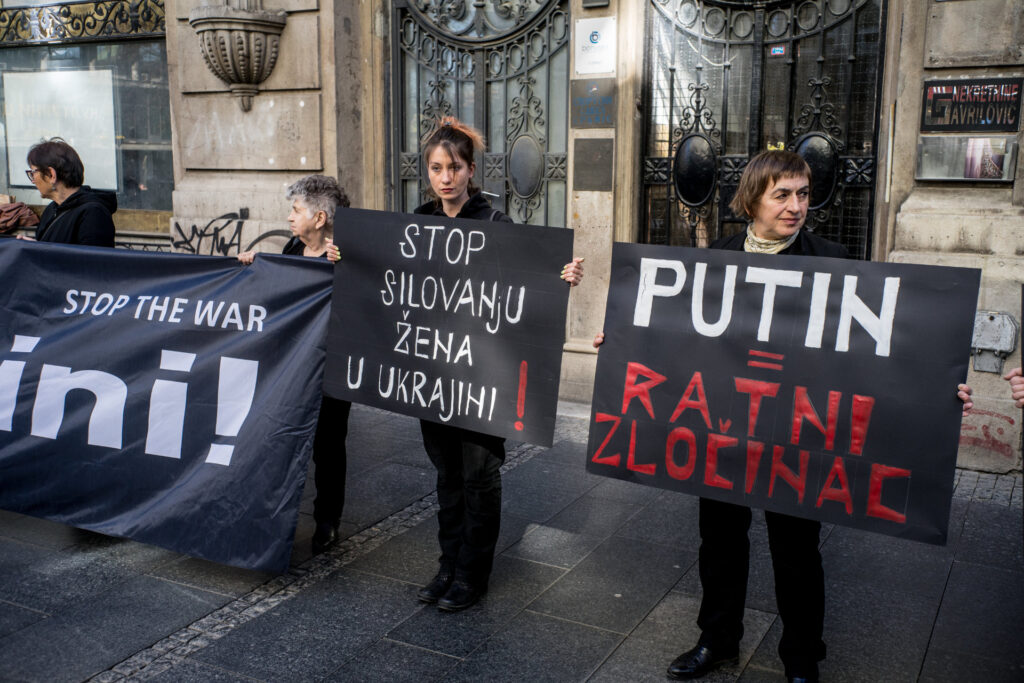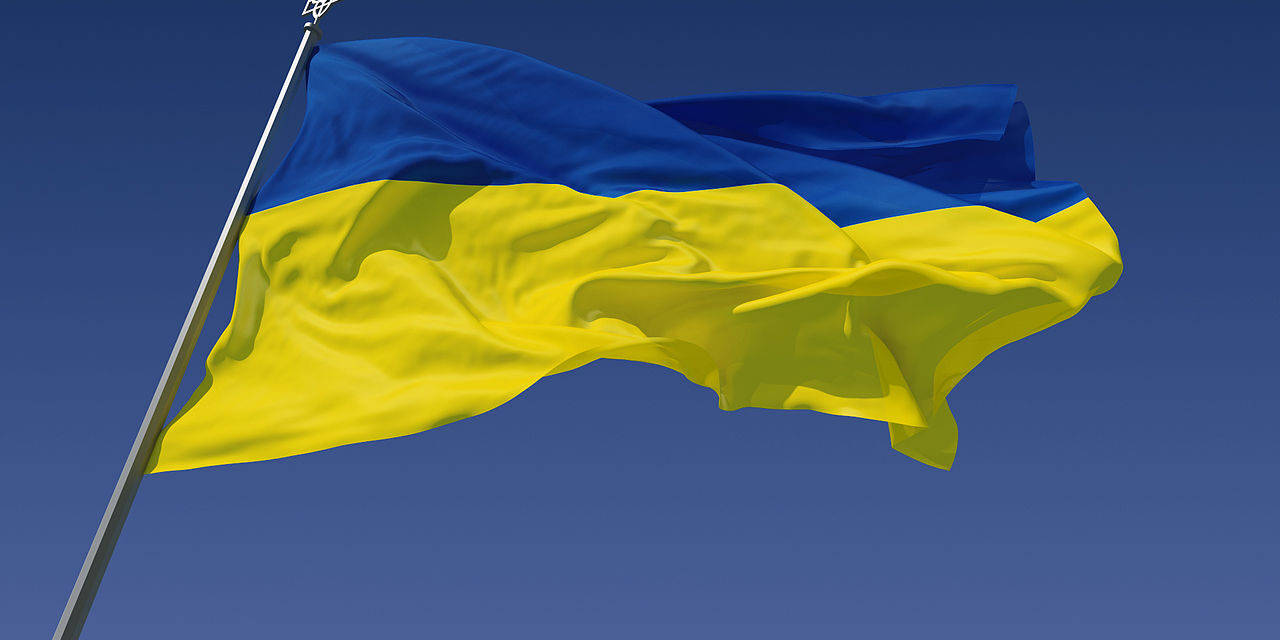As the devastating war in Ukraine continues, SEEstage writers discuss the acts of solidarity, support and protest being carried out by activists and cultural workers across the region
Kosovo – Florida Kastrati
I have a few vague memories of the war. At that time (1998-99), I was 4 and we had packed our bags ready to flee, in case we were persecuted. At the time the act of going away seemed pleasant and adventurous to me, only later did I understand that what I thought of as an adventure, was far from it.
Now social media is full of photos of people abandoning their homes and fleeing the war zone in Ukraine, women and men carrying rifles and other weapons. There have been many comparisons between the two countries, with Kosovan children and Ukrainian children crossing borders and being helped. I understand this need to compare. It emerges from the pain and the memories of war that were evoked in so many of Kosovans, when they heard of the situation in Ukraine. Though it may be distant physically, it was close to us.
Many Kosovans experienced the news of the war in a terrible way, since their memories were brought back to the surface again, reminding them the pain they suffered during that time, the people they lost, the trauma, the scenes they will never forget and their burnt houses which they had to rebuild from scratch.
Solidarity rallies with Ukraine took place in front of the National Theater uniting the people of Kosovo in the mission of protesting against the war on Ukraine and the aggression of Russia.
On 3rd March, the Parliament of Kosovo approved a resolution condemning Russia’s invasion of Ukraine and expressing its willingness to host 5,000 Ukrainian refugees. The parliament also asked the government to allocate a special fund to help the Ukrainian people.
After approving the resolution to host Ukrainian refugees, Kosovo also lifted the visa requirements for Ukrainian citizens, despite the fact that the Ukraine doesn’t recognize our state.
Moreover, Foreign Minister Donika Gërvalla, announced that our country is preparing to host the families of the 40 Ukrainian soldiers that are currently in Kosovo as part of the NATO mandated Kosovo Force (KFOR).
Along with this modest help, Kosovo is contributing to Ukraine’s free speech and to the importance of sharing non-propagandistic information by showing readiness to accept 20 Ukrainian journalists together with their families, to live and freely practice their profession in Kosovo.
Yet beside the pain and solidarity, a sense of worrying about our own safety prevails. A sense of insecurity is preoccupying most of the Kosovans since Russian’s invasion began. Even the Prime Minister of the country, Albin Kurti declared that the attack against Ukraine is “an attack against us all.”
As a result of these events, membership of NATO and other international organisations is seen as a must by Kosovo’s parliament, which is strongly lobbying for it.
Serbia – Borisav Matić
The response of the Serbian theatre community to the Russian invasion of Ukraine is largely non-existent. Mute. Ignorant. Pick an adjective you like. The theatre scene is generally slow to react to any major sociopolitical events, no matter if those are wars, refugee crises, pandemics, or economic instabilities. But while theatre lives on in its own imaginarium of “universal” questions of yesterday, other parts of Serbian society – including politics, activism, media and sports – are clashing in a performative manner that reflects polarization between a pro-Russian populace, pro-Western advocates and those dedicated to peace and anti-imperialism.
It’s become a commonplace both in domestic and international media to note that Serbia is sitting on both sides of the Western-Eastern fence and it has become painful to watch Serbian leadership trying to balance its friendship with Putin and interest in joining the European Union.
Thus, a political performance began on 24th February – Serbia voted at the UN General Assembly to condemn Russia’s invasion and later to exclude Russia from the UN Human Rights Council, but resisted sanctions on Russia and maintained friendly relations with the country.
At the beginning of the war, Ukraine’s ambassador Oleksandr Aleksandrovych was invited to the pro-government Happy TV but didn’t have a lot of time to explain the situation in Ukraine since he faced pro-Russian commentators and long videos of Putin’s speeches. Until the presidential and general elections on 3rd April, president Vučić strongly held on to the notion that Serbia is neutral in every way, but after the election which he won, he noted that Serbia is only militarily neutral, but politically aligns itself with the EU.
The pro-Russian sentiment disguised as neutrality spilled over, also in a performative way, into the sports scene. At the beginning of the basketball match in Kaunas, between the Lithuanian team Žalgiris and the Serbian Red Star, Lithuanian players held a Ukrainian flag with the sign “Stop the war” while Red Star’s leadership forbid its players to join the gesture. An American playing for Red Star, Aeron White, later dissented decrying the ban and saying that he opposes the war.
During Red Star’s football match in Belgrade on 17th March, its fans displayed multiple signs listing the US’s aggressions around the world, from Korea in 1950 to Syria in 2011, concluding their message with the caption “All we are saying is give peace a chance”. It’s worth noting that a big part of Serbia’s hardcore football fans is known for their hooliganism and extreme-right views, including hatred towards other ethnic groups in the ex-Yu region, as well as sexual and gender minorities. But their “performance” at the match on 17th March points to a larger feeling in Serbian society – that the West is hypocritical in the condemnation of Russia since it committed numerous war crimes with impunity, including the unauthorized NATO aggression on Yugoslavia in 1999.
It goes without saying that the West’s imperialism doesn’t justify Russia’s, and the other way around. But a large part of Serbia’s society struggles to understand this since it’s still stuck in the loop of self-victimization because of the war traumas of the 1990s. There is a light in the dark, though, and there are many people in Serbia who feel compassion for Ukrainians’ suffering and they see the Russian invasion as a hideous war crime, as it is. One of the best examples is the activist, feminist and pacifist group Women in Black which was founded in 1991 to protest the war perpetrated by Milošević’s repressive regime. They uncompromisingly fought against militarism, sometimes risking their safety. After the war, they continued to remind us of the war crimes committed in the 1990s, but they also draw attention to other conflicts, such as the war in Syria and Israel’s terror against the Palestinian people. Women in Black have tirelessly protested the invasion of Ukraine on the streets of Belgrade, one time closely avoiding conflict with a pro- Russian group. Their signs during protests show messages such as: “Stop the occupation of Ukraine”.

Women in Black protest in Belgrade
Albania – Flamur Dardeshi and Daniela Gjopalaj
In an interview, Albanian writer Ismail Kadare described how the elders in his hometown of Gjirokastra enjoyed discussing foreign politics and geopolitics (despite Albania’s complete isolation from the rest of the world at the time).
Politics remains the favorite sport of Albanians. Political shows dominate Albanian television, and the Prime Minister Edi Rama is the most important showman in the country.
Since the beginning of the war in Ukraine, politics in Albania has condemned Russia’s act, imposing sanctions against Russia. Edi Rama even had a telephone conversation with Ukrainian President Zelenksyy, where he promised total support from Albania, despite the fact that Albania has little to give economically or militarily.
Citizens and civil society have openly expressed support for Ukraine, with anti-war protests in front of the Russian Embassy.
But theater or art in Albania seem to move (when they do) at a significantly slower pace than everyday life. So far, none of the theaters in the capital (National, Experimental and Metropolitan), nor the city theaters have given performances that could be tied to the situation in Ukraine in any manner.
The performances had neither war or humanitarian themes, nor did they aim to raise awareness about the conflict in Ukraine. On the contrary, in recent months, comedies have erupted in Albanian theaters.
However, it is characteristic of the theater institutions in Albania that the works which are staged do not have much to do with what is happening in reality, although this, in fact, is the greatest power of the theater.
Indeed, behind the curtain of exciting political propaganda colors and phone calls between heads of state, Albanian society is treating the war in Ukraine and what is going on in the world with the same zeal as the elders in Gjirokastra, who sipped coffee while discussing geopolitics while living under the hooves of one of Eastern Europe’s most brutal dictators.
North Macedonia – Ivanka Apostolova Baskar
In Macedonia, we have created an effective corridor that successfully accommodates and assists refugees from Ukraine – the members of the Association of Ukrainians in R.N. Macedonia – ‘Ukrainian Lesja’. The Government of R.N Macedonia has allocated MKD 1200 000 for the assistance of the Ukrainian refugees, intended for their temporary hotel accommodation and additional services. Ballet dancer E.M Stebljak from Kyiv, together with the ballet ensemble of the Macedonian Opera and Ballet are preparing Giselle for the 2021/2022 season in MOB Skopje. Individual Macedonian artists from all areas of culture and art are supporting their fellow artists and friends from Ukraine, with whom they studied and/or performed together, (public support via social media and in collaboration with ‘Ukrainian Lesja’ for specific help).
In our country, politics is more important than art – politicians have further reduced the processes and costs of national cultural institutions in order that part of the funds to be used to help refugees from Ukraine, but also as vague measures to economize in the actual post-pandemic, energy and war crises, in which the current government has condemned the Russian attacks and sided with Ukraine.
While artists in Macedonia condemn every war, they do not share condemnation and punishment of Russian artists and cultural workers – because global politics will drive out all its interests at any cost, unjustly involving cultural workers and artists in their dirty games, subversively forcing them to choose a side like we are small children playing cowboys and Indians.
Slovenia – Iva Š. Slosar
Slovenian cultural workers and art institutions responded with various expressions support since the first days of the Russian attack on Ukraine. Almost all Theaters and other cultural institutions have expressed support on social media and called for participation in charitable fundraising campaigns.
The Slovenian Youth Orchestra organized the evacuation of 67 musicians of the Youth Symphony Orchestra of Ukraine and their companions. They are now based in Ljubljana, and some of the musicians performed at a charity concert ‘Let’s stand together for Ukraine.’ A concert to help refugees was organized by RTV Slovenia.
The Temporama Association, in cooperation with the Academy of Theatre, Radio, Film and Television, the Association of Slovenian Filmmakers’ Associations and AIPA, organized a screening of three Ukrainian documentaries dealing with the aftermath of the fighting in eastern Ukraine over the past decade. Voluntary contributions went to the Tabor Film Production Fund and the Docudays UA festival, which provided Ukrainian filmmakers in Kiev with bulletproof vests.
However, some responses were directed at the Russian side. Following a decision of the Government the Russian Center for Science and Culture in Ljubljana has closed its doors. Head of the Center and three other employed were required to leave Slovenia. The Slovenian Russian-speaking community called for the preservation of the center with petition. In it, they expressed opposition to the war, while emphasizing the important role that the center plays in supporting for the common culture of Slavdom. The case has raised question of the meaning of a boycott of Russian culture.
The poet and writer professor Boris A. Novak also responded to the suffering of civilians in the war. In the poem entitled Testimony and subtitled Croatia 1991, Bosnia 1992, Ukraine 2022 he wrote:
Who will take the old men for a walk around the block?
Who will sing to the dead at weddings?
Should I write a poem now when I’d rather scream?
But time demands poems, not crying.
I’m guilty too. I, silent, timid witness.
Germany – Tom Mustroph
The war in Ukraine produced mixed reactions in Berlin. Political Berlin proved its classical ignorance towards Eastern Europe when Chancellor Olaf Scholz expressed the opinion that the Russian invasion was the first war in Europe for 70 years. Putting aside the fact that the Balkan countries, as well as Georgia and Moldova only belong to Europe when there are qualifying matches for European or World championships, the reaction in the arts scene has been strong. There were immediate actions, protests and solidarity events and networks were created for Ukrainian artists. The most notable of these actions originated in the context of the avant garde Radar Ost festival by Deutsches Theater and the free company Ogalala Kreuzberg. Both initiatives have long established working relations to artists in Ukraine and beyond.
Ogalala artistic director Christine Dissmann coordinates direct financial support for artists, who still are in Ukraine and use their facilities as shelters like the Pro English Theatre or work directly with helping displaced people.
In the attempt to organize working possibilities firstly for their partner organization Left Bank Theatre Kyiv and others, Radar Ost curator Birgit Lengers initiated a list of more than 130 theatre institutions in Germany, Austria and Switzerland, who want to support Ukrainian artists logistically, financially and symbolically.
Together with Left Bank Theatre director Stas Zhyrkov, Lengers tried to establish a working platform in Berlin. “Some people of Left Bank Theatre already are in Berlin. Stas at the moment is in Vilnius, where he has a premiere, but will follow”, Lengers told seestage.org. What dimension this Berlin working platform for Ukranian artists will have is still unclear.
While supporting their Ukrainian partners Lengers also reached out for Russian partners. Moscow director Kirill Serebrennikov moved to Berlin. His mid-term goal is to create a Gogol Europe platform, as a continuation of the work of Gogol Theatre in Moscow.
The idea of Croatian director – and member of the artistic board of Gorki Theater – Oliver Frljic was to create a Berlin-wide working platform for exiled theatre artists from all affected countries, Ukraine, Belarus and Russia, but unfortunately this did not have substantial resonance. Cultural politics and support initiatives follow, at the moment, more nationalistic tracks and dynamics, although at least communication among long-time partners and colleagues continues beyond borders and nationalities.
To create non-nationalist open spaces seems to be a big challenge for theatre during this ongoing war and after an end of atrocities, which will hopefully come soon. Meanwhile activists in the German cultural field have been quite good in organizing help and funding for Ukrainian artists, who want to continue their career in Germany.
Artists at Risk coordinates research for resources as funding, residencies, working spaces. Touring Artists provides help regarding registration, immigration and first steps in Germany. The initiatives Help Dance and tanz+gelb+blau are supporting dancers and choreographers.
How effective all this help will be and how big the bureaucratic obstacles will grow in overregulated Germany is to be seen.
Further reading: Radar Ost festival – venturing beyond frontiers
Natasha Tripney is a writer, editor and critic based in London and Belgrade. She is the international editor for The Stage, the newspaper of the UK theatre industry. In 2011, she co-founded Exeunt, an online theatre magazine, which she edited until 2016. She is a contributor to the Guardian, Evening Standard, the BBC, Tortoise and Kosovo 2.0








